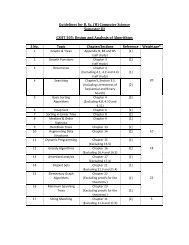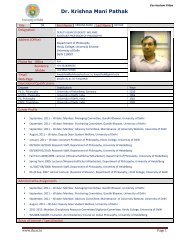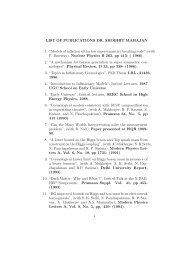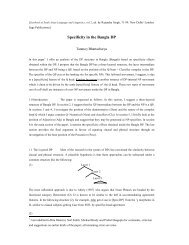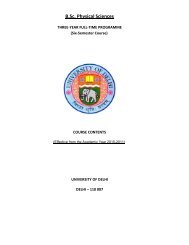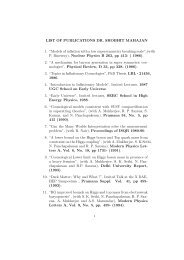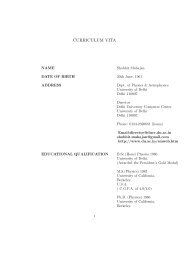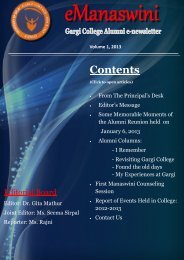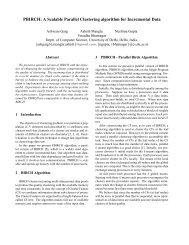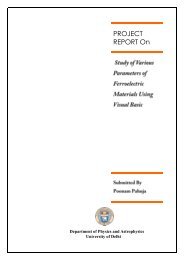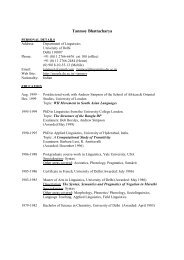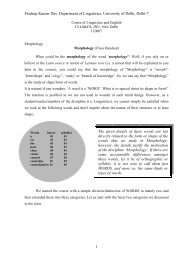Book-Review Thich Nhat Hahn, Understanding Our Mind, New Delhi ...
Book-Review Thich Nhat Hahn, Understanding Our Mind, New Delhi ...
Book-Review Thich Nhat Hahn, Understanding Our Mind, New Delhi ...
- No tags were found...
You also want an ePaper? Increase the reach of your titles
YUMPU automatically turns print PDFs into web optimized ePapers that Google loves.
Thây points out that our habit energies, delusions, and craving cometogether and create a tremendous source of energy (he calls it manas) thatconditions our actions, speech, and thinking. This manas hinders the functioningof the store consciousness and gets in the way of transforming the seeds. The modeof perception of manas is always false... creating and maintaining erroneousperceptions (p.91). “<strong>Our</strong> mind is enslaved when it is picked up and embraced as a‘self’ by manas” (p.93). “The nature of manas is delusion, ignorance, anddiscrimination. It is imprisoned in its delusion and its craving for duration andsatisfaction. Manas seeks to satisfy craving, even when doing so might beunhealthy. It drives us in the direction of attaining pleasure, but it often turns outto be the kind of pleasure that does not actually bring happiness. But becausemanas does not see where it is going, the fruits of its journey are often more painfulthan happy, more sad than joyful” (p.114).Manas “is born from the blocks ofignorance that are present as seeds in our store consciousness. It is always there,grasping the idea of self and the idea of nonself. It is always discriminating: this isme, this is mine, this is self; that is not mine, that is not self. With or without ourconscious awareness, that is the work of manas, and it works continuously”(pp.98-99). “Self-view is the false view that the self is independent and eternal, thatit exists apart from other factors of existence. Self-pride is the attitude that we arebetter, more intelligent, more beautiful, or more important than others. Self-loveis when we love ourselves excessively, when everything we say, do, or think,shows how caught up with ourselves we are” (pp.111-12). The way to help manasstop grasping at the notions of self and non-self is for us to practice deep-lookinginto the impermanent and interdependent nature of reality (p.99). By doing so, wecan work toward transforming the seeds in our store consciousness so that theymanifest in a wholesome way and not as the false perceptions of manas(p.104).“The goal of meditation is to make a change at the root of manas and thestore consciousness” (p.106). Thây calls it transformation at the base which cantake place only through the light of mindfulness. Through mindfulness, we canturn and go in the direction of awakening and “transform the nature of manas alittle bit each day and release our store consciousness more and more from its grip”(p.106).“When we use our mind consciousness to generate the energy ofmindfulness by practicing mindfulness... we water the seed of mindfulness that isalready present in our store consciousness. When we use the energy of mindfulnessto touch other seeds, we help those seeds transform” (p.107).When our mind consciousness is able to perceive things directly, it iscapable of touching the realm of suchness, points out Thây. And the way to trainour mind consciousness in correct perception is through mindfulness. “This is whyit is so important to train our mind consciousness in the habit of mindfulness”(p.121). “Just as store consciousness is the base of manas, and manas is the baseof mind consciousness, the five sense consciousnesses are based in the sixthconsciousness, mind consciousness.... The senses from which these fiveconsciousnesses arise are... “gates”... [A]ll dharmas... enter our consciousness13



